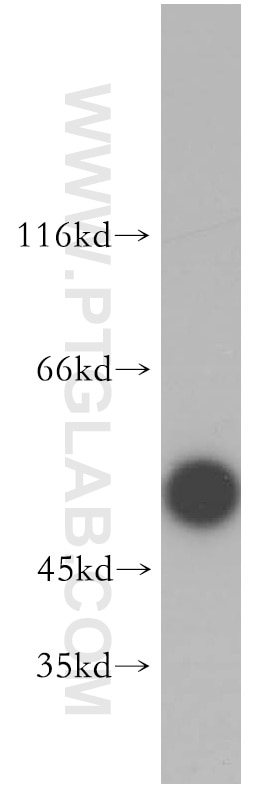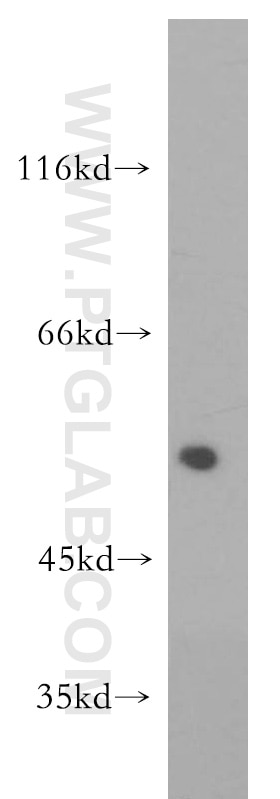COL4A6 Polyklonaler Antikörper
COL4A6 Polyklonal Antikörper für ELISA
Wirt / Isotyp
Kaninchen / IgG
Getestete Reaktivität
human, Maus und mehr (1)
Anwendung
WB, IHC, IF, ELISA
Konjugation
Unkonjugiert
Kat-Nr. : 10807-1-AP
Synonyme
Geprüfte Anwendungen
Veröffentlichte Anwendungen
| WB | See 4 publications below |
| IHC | See 2 publications below |
| IF | See 2 publications below |
Produktinformation
10807-1-AP bindet in WB, IHC, IF, ELISA COL4A6 und zeigt Reaktivität mit human, Maus
| Getestete Reaktivität | human, Maus |
| In Publikationen genannte Reaktivität | human, Maus, Ratte |
| Wirt / Isotyp | Kaninchen / IgG |
| Klonalität | Polyklonal |
| Typ | Antikörper |
| Immunogen | COL4A6 fusion protein Ag1118 |
| Vollständiger Name | collagen, type IV, alpha 6 |
| Berechnetes Molekulargewicht | 1691 aa, 164 kDa |
| GenBank-Zugangsnummer | BC005305 |
| Gene symbol | COL4A6 |
| Gene ID (NCBI) | 1288 |
| Konjugation | Unkonjugiert |
| Form | Liquid |
| Reinigungsmethode | Antigen-Affinitätsreinigung |
| Lagerungspuffer | PBS with 0.02% sodium azide and 50% glycerol |
| Lagerungsbedingungen | Bei -20°C lagern. Nach dem Versand ein Jahr lang stabil Aliquotieren ist bei -20oC Lagerung nicht notwendig. 20ul Größen enthalten 0,1% BSA. |
Hintergrundinformationen
Collagen alpha-6(IV) chain, known as COL4A6, is a member of the collagen family, the major structural component of basement membranes. There are six type IV collagen isoforms, alpha 1(IV)-alpha 6(IV), each of which can form a triple helix structure with 2 other chains to generate type IV collagen network. COL4A6 forms a triple helical structure with two other alpha-5-chains, which is stabilized by the presence of glycine as every third residue (PMID: 27377778). COL4A6 is located on the X chromosome in a head-to-head manner with COL4A5 closely (PMID: 23714752). COL4A6 is transcribed from two alternative promoters in a tissue-specific fashion. This antibody detected the cleaved fragment of COL4A6 at ~50 kDa (PMID: 7657706)..
Protokolle
| PRODUKTSPEZIFISCHE PROTOKOLLE | |
|---|---|
| WB protocol for COL4A6 antibody 10807-1-AP | Protokoll herunterladen |
| STANDARD-PROTOKOLLE | |
|---|---|
| Klicken Sie hier, um unsere Standardprotokolle anzuzeigen |
Publikationen
| Species | Application | Title |
|---|---|---|
Oncogene Hepatitis B virus X protein promotes the development of liver fibrosis and hepatoma through downregulation of miR-30e targeting P4HA2 mRNA. | ||
Polymers (Basel) The Development of a 3D PET Fibrous Scaffold Modified with an Umbilical Cord dECM for Liver Tissue Engineering | ||
Toxicol Appl Pharmacol High doses of baicalin induces kidney injury and fibrosis through regulating TGF-β/Smad signaling pathway. | ||
J Tissue Eng Regen Med Topographical and Chemical Inductive Cues Synergistically Enhance the Schwann Cell Differentiation of Aligned Dental Pulp Stem Cell Sheets | ||
J Immunol Res Partial Reconstruction of Uterus Cervix in Rat by Decellularized Human Uterine Cervical Scaffold Combined with Adipose-Derived Stem Cells (ADSCs) | ||
Oral Dis Artemisinin suppressed tumour growth and induced vascular normalisation in oral squamous cell carcinoma via inhibition of MIF |



